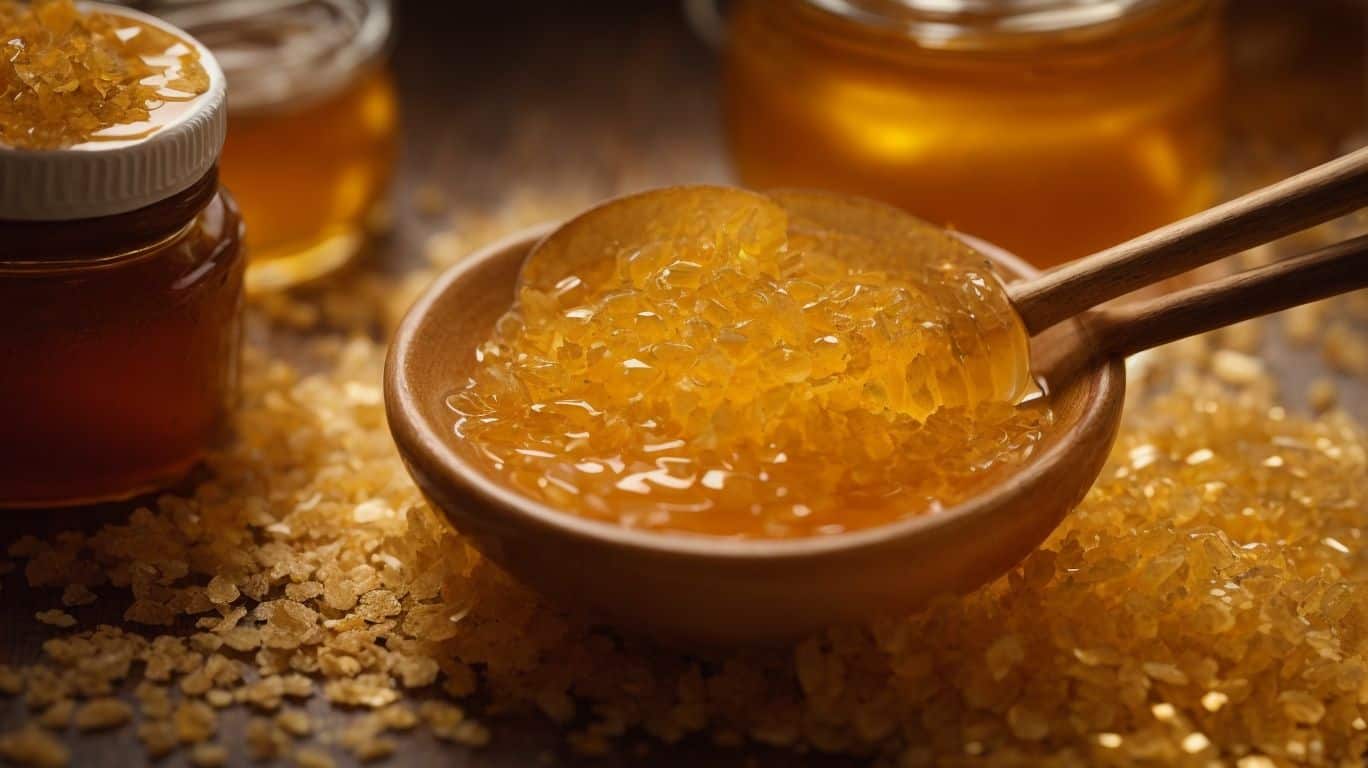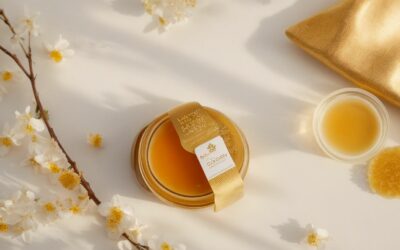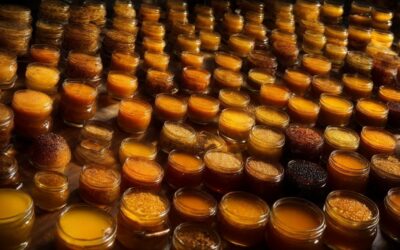Are you tired of constantly dealing with allergies and looking for a natural remedy? Look no further than manuka honey! It contains unique compounds that can help alleviate allergy symptoms and boost your immune system.
In this article, we will explore the benefits of manuka honey and how it can improve your overall health. Say goodbye to allergies and hello to a healthier you!
How Does Manuka Honey Help With Allergies?
While manuka honey has been praised for its numerous health benefits, it has also gained attention for its potential to alleviate allergies. In this section, we will delve into the ways that manuka honey can help with allergies.
First, we will explore its anti-inflammatory properties, which can provide relief for allergy symptoms. Then, we will discuss its antioxidant properties and how they can support the body’s response to allergens.
Lastly, we will look into how manuka honey can boost the immune system to better fight off allergies.
1. Anti-inflammatory Properties
Manuka honey is known for its anti-inflammatory properties, which can be beneficial in relieving allergy symptoms. To make the most of these benefits, follow these steps when using Manuka honey:
- Choose a high-quality Manuka honey with a high Unique Manuka Factor (UMF) rating.
- Incorporate one to two tablespoons of Manuka honey into your daily routine. You can consume it directly or mix it with warm water or herbal tea.
- For topical use, mix Manuka honey with a carrier oil or use it as a face mask on affected areas.
- Leave the honey on for 20-30 minutes before rinsing off with warm water.
- Regularly repeat these steps to experience the anti-inflammatory effects of Manuka honey.
In addition to its anti-inflammatory properties, Manuka honey can also help reduce allergic reactions and provide relief from symptoms such as congestion and itching.
2. Antioxidant Properties
Manuka honey is renowned for its exceptional antioxidant properties, which play a significant role in its ability to alleviate allergies. These powerful antioxidants work to combat inflammation and oxidative stress within the body, effectively reducing allergic symptoms.
With high levels of antioxidants, including phenolic compounds and flavonoids, Manuka honey is a potent natural remedy for allergy relief.
Moreover, the antioxidants found in Manuka honey also boost the immune system, providing additional support in managing allergies.
Whether consumed as part of your diet or applied topically, incorporating Manuka honey into your routine can tap into its remarkable antioxidant properties for relief from allergies.
3. Boosts Immune System
Boosting the immune system is one of the many benefits of manuka honey. To enhance its immune-boosting properties, follow these steps:
- Choose high-quality manuka honey with a high Unique Manuka Factor (UMF) rating.
- Incorporate a daily teaspoon of manuka honey into your diet, either on its own or mixed with warm water or herbal tea.
- Utilize manuka honey as a natural sweetener in recipes, such as in smoothies or salad dressings.
- Apply manuka honey topically to wounds or skin irritations to promote healing and prevent infections.
- Store manuka honey in a cool, dry place away from direct sunlight to preserve its potency.
What Are The Types Of Allergies That Manuka Honey Can Help With?
Manuka honey is known for its numerous health benefits, including its potential to alleviate allergies. However, not all allergies are the same and may require different approaches for relief.
Here, we will discuss the various types of allergies that manuka honey can help with, including seasonal allergies that affect many during certain times of the year, food allergies that can cause discomfort and digestive issues, and skin allergies that can result in irritation and discomfort.
By understanding the specific types of allergies that manuka honey can assist with, we can better utilize this natural remedy for optimal results.
1. Seasonal Allergies
Seasonal allergies are a common issue for many people. Here are some steps to help manage them using Manuka honey:
- Choose high-quality Manuka honey with a high UMF (Unique Manuka Factor) rating.
- Consume a teaspoon of Manuka honey daily to help build immunity against allergens.
- Try incorporating Manuka honey into your diet by adding it to tea or smoothies.
- Consider using Manuka honey as a natural sweetener in recipes.
- If you experience allergies during certain seasons, apply a thin layer of Manuka honey topically to soothe irritation.
Sarah, an allergy sufferer, started using Manuka honey daily and noticed a significant reduction in her seasonal allergy symptoms. She now enjoys the outdoors without the usual discomfort.
2. Food Allergies
- Identify food allergies: Determine which specific foods trigger an allergic reaction by consulting a healthcare professional.
- Avoid allergenic foods: Eliminate all foods that cause an allergic reaction from your diet.
- Read labels: Check food labels for potential allergens and avoid consuming products that contain them.
- Prepare meals at home: Control the ingredients in your meals by cooking at home, reducing the risk of cross-contamination or accidental consumption of allergenic foods.
- Inform others: Let friends, family, and restaurant staff know about your food allergies to ensure that precautions are taken when preparing or serving food.
Remember, always consult a healthcare professional for personalized advice and guidance on managing food allergies.
3. Skin Allergies
When it comes to managing skin allergies, Manuka honey can be a natural and effective remedy. Here are some steps you can follow to use Manuka honey for skin allergies:
- Cleanse the affected area gently with a mild cleanser or warm water.
- Apply a thin layer of Manuka honey directly to the affected area.
- Leave it on for about 20-30 minutes.
- Rinse off with lukewarm water and pat dry.
- Repeat this process 1-2 times daily for best results.
Fun fact: Manuka honey has been used for centuries in traditional medicine for its healing properties. Its antibacterial and anti-inflammatory properties make it an excellent choice for treating skin allergies.
How To Use Manuka Honey For Allergies?
For centuries, manuka honey has been used as a natural remedy for a variety of health concerns. In recent years, it has gained popularity as a potential treatment for allergies. But how exactly can manuka honey be used for allergies?
In this section, we will explore two methods of using manuka honey for allergies: consuming it orally and applying it topically. By understanding the different ways to use this powerful honey, you can determine the best approach for your specific allergy needs.
1. Consuming Manuka Honey
Incorporating Manuka Honey into your diet can have various benefits for your health, especially for allergies. Here are some steps to follow:
- Choose a high-quality, authentic Manuka Honey with a Unique Manuka Factor (UMF) rating of 10 or higher.
- Begin with a small amount, such as one teaspoon per day, and gradually increase if it is well tolerated.
- Take Manuka Honey on an empty stomach in the morning or before meals to ensure maximum absorption.
- Consider mixing it into warm water or herbal tea to soothe your throat and nasal passages.
- Remember that Manuka Honey is a natural sweetener, so be mindful of your overall sugar intake.
- Store Manuka Honey in a cool, dry place away from direct sunlight to maintain its potency.
2. Applying Manuka Honey Topically
Using manuka honey topically can provide relief for various skin conditions and aid in healing.
- Start by cleansing the affected area with mild soap and water.
- Gently dry the area with a clean towel.
- Apply a thin layer of manuka honey directly to the skin using clean hands or a cotton swab.
- For maximum benefits, leave the honey on for at least 30 minutes or overnight.
- Rinse off the honey with warm water and pat the skin dry.
- Repeat this process daily or as needed until the skin condition improves.
Throughout history, honey has been utilized topically for its antimicrobial properties. In fact, ancient Egyptians used it to treat wounds, and honey has been a popular remedy in traditional Ayurvedic medicine.
Are There Any Risks or Side Effects of Using Manuka Honey for Allergies?
As with any alternative treatment, it is important to consider the potential risks and side effects of using manuka honey for allergies. In this section, we will discuss the possible adverse reactions that may occur when using this natural remedy.
From allergic reactions to interactions with medications, we will explore the potential risks of incorporating manuka honey into your allergy treatment plan.
Additionally, we will touch on the potential concerns surrounding the high sugar content of this honey and its effects on those with certain health conditions.
1. Allergic Reactions
Allergic reactions to manuka honey are rare, but it’s important to be aware of the potential risks. Here are some steps to consider:
- Check for allergies: Before using manuka honey, test a small amount on your skin to check for any adverse reactions.
- Consult a healthcare professional: If you have a history of severe allergies or are unsure about using manuka honey, consult with a healthcare professional for guidance.
- Monitor for symptoms: Pay close attention to any signs of an allergic reaction, such as itching, swelling, hives, or difficulty breathing.
- Discontinue use: If you experience any allergic reactions after using manuka honey, stop using it immediately and seek medical attention if necessary.
Remember, while manuka honey has many potential benefits, it’s important to prioritize your safety and well-being.
2. Interactions with Medications
Interactions between manuka honey and medications can occur, so it’s important to be cautious when using them together. Here are some steps to consider:
- Consult your healthcare provider: Before using manuka honey alongside any medications, it’s crucial to seek professional advice.
- Inform your healthcare provider: Make sure to inform your healthcare provider about potential interactions between your medications and manuka honey, and provide details about your medications.
- Check for contraindications: Research potential interactions between your medications and manuka honey to identify any contraindications or negative effects.
- Adjust dosage if necessary: If your healthcare provider deems it safe to use manuka honey with your medications, they may recommend adjusting the dosage of either the medication or the honey itself.
- Monitor for side effects: Keep a close eye on any adverse reactions or unexpected side effects while using manuka honey with your medications.
3. High Sugar Content
Manuka honey is known for its high sugar content, which is a crucial factor to consider when using it for allergies. While the sugar in this type of honey can provide energy, it is important to be mindful of potential blood sugar spikes if consumed excessively.
Individuals with diabetes or those monitoring their sugar intake should exercise caution. It is recommended to use Manuka honey in moderation to avoid any negative effects from its high sugar content.
If you have concerns about the sugar level, it is advised to consult with a healthcare professional before incorporating Manuka honey into your diet. Proper storage and controlled consumption can help mitigate any potential risks.
How To Choose and Store Manuka Honey?
Choosing and storing Manuka honey requires attention to quality, authenticity, and proper storage conditions. Follow these steps to ensure you make the right choice and keep your honey fresh:
- Look for a UMF (Unique Manuka Factor) rating of at least 10 to guarantee quality.
- Check for the UMF trademark or license number on the label to ensure authenticity.
- Consider the MGO (Methylglyoxal) content, which indicates the antibacterial strength.
- Store the honey in a cool, dry place away from direct sunlight and heat.
- Avoid using wet spoons or introducing moisture to prevent spoilage.
Pro-tip: To get the most out of Manuka honey, consume it within 1-2 years from the date of purchase while maintaining proper storage conditions.
I’m a Manuka honey enthusiast and creator of Manuka Honey Organic, a blog where I share my journey with authentic Manuka honey from New Zealand. I want everyone to learn about the healing powers of Manuka honey.





